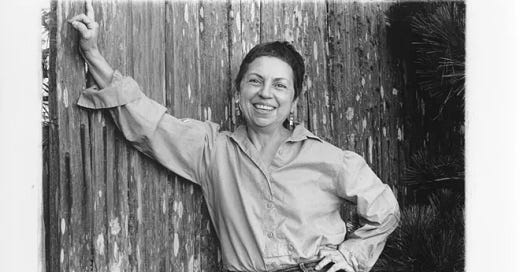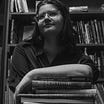Gloria Anzaldúa's Multifaceted Identities
Clare Ashcraft on a champion of the black sheep
Dear Republic,
We’re continuing pieces from the underestimated writers’ series — this one on Clare Ashcraft’s ribcage-shaking encounter with a life-changing writer.
-ROL
GLORIA ANZALDÚA’S MULTIFACETED IDENTITIES
In my senior year as an English and philosophy undergrad, I took a class called PHIL-370 Major Philosophers: Gloria Anzaldúa expecting to hate it. I’d never heard of the woman, but she was pitched as a queer and disability activist, philosopher, feminist, and Chicana scholar. I dreaded the idea that I would have to spend an entire semester reading and discussing identity politics and racial and gender activism. Instead, I fell in love with her.
Anzaldúa is best known for co-editing the anthology This Bridge Called My Back: Writings by Radical Women of Color (1981) and her semi-autobiographical work Borderlands/La Frontera: The New Mestiza. Borderlands (1987) is part memoir, part theory, and part poetry collection, half written in Spanish and half in English. Like any good writer, she understands that the medium is the message.
In the book she weaves her experiences — as a Chicana living in the borderlands, as a lesbian, as a woman, as a spiritual person, as a writer — in and out of her theory of Mestiza Consciousness. The original meaning of “Mestiza” is someone of mixed ancestry, usually white European and non-European Indigenous — someone who has the blood of the oppressor and the oppressed. Anzaldúa expands the term to reflect the consciousness of anyone with mixed or in-between identities. Mestiza Consciousness describes the psychology of anyone whose identity is a bridge.
As a Mestiza, Anzaldúa speaks to her ethnic culture being patriarchal and the lesbian community being racist and the burdens of those experiences, but they are also crossroads. Her mixed identity allows her to communicate across homogenous group identities and transcend binary thinking.
As a Mestiza, I have no country, my homeland cast me out; yet all countries are mine because I am every woman’s sister or potential lover. As a lesbian I have no race, my own people disclaim me; but I am all races because there is the queer of me in all races. I am cultureless because, as a feminist, I challenge the collective cultural/ religious male-derived beliefs of Indo-Hispanics and Anglos; yet I am cultured because I am participating in the creation of yet another culture, a new story to explain the world and our participation in it, a new value system with images and symbols that connect us to each other and the planet… I am an act of kneading, of uniting and joining that not only has produced both a creature of darkness and a creature of light, but also a creature that questions the definitions of light and dark and gives them new meanings… In our very flesh, (r)evolution works out the clash of cultures. It makes us crazy constantly, but if the center holds, we’ve made some kind of evolutionary step forward… Our role is to link people with each other.
It struck me that I couldn’t have been more wrong in my assumptions about Anzaldúa. She was on the left, but her work was not based in shallow identity politics. It was the antidote to such shallow thinking. She doesn't shy away from discrimination; many poems are spent on the backbreaking work of Chicanas and immigrants. Yet, she declines to simplify everything into an oppressor and oppressed framework.
Anzaldúa writes:
A counterstance locks one into a duel of oppressor and oppressed; locked in mortal combat, like the cop and the criminal, both are reduced to a common denominator of violence. The counterstance refutes the dominant culture’s views and beliefs, and, for this, it is proudly defiant. All reaction is limited by, and dependent on, what it is reacting against… But it is not a way of life. At some point, on our way to a new consciousness, we will have to leave the opposite bank, the split between the two moral combatants somehow healed so that we are on both shores at once and, at once, see through serpent and eagle eyes.
Anzaldúa’s prescription for viewing identity is to treat one another as human and for Mestizas to share their humanity with other groups, regardless of whether they have been dehumanized.
I was so enamored by her explanations of how to do this, that I wrote my senior undergraduate thesis on it. I focused on James Baldwin, Anzaldúa, and the rejection of protest literature, using Borderlands as an example of a kind of anti-protest novel, one that refuses to flatten minority identity in the name of justice, but instead expands the depths of it, holding its contradictions. Not only did it inspire my academic thesis, but it is also the namesake for my Substack
.Anzaldúa’s theories are quite clearly culturally relevant. I would go as far as to say they could save an identity-obsessed left from itself. But, they’re also personally relevant.
I admire that Anzaldúa didn’t separate theory from memoir. It’s a dangerous game —intertwining emotions and personal experiences with ideas about culture — because it opens us up to critiques that could make us bleed. But it’s an act of honesty and humility. For each of us, our ideas are influenced by our experiences. Many of us will rationally admit that, but still prefer to keep the personal as separate as we can from the political and philosophical. We’re human though, and we’re all subject to confirmation bias and emotional reasoning whether or not we want to display it publicly.
In my own writing, I’ve taken after Anzaldúa, mixing academic observations and cultural commentary with personal experience in an attempt to give readers my full self. I do not squirrel away political opinions pretending they aren’t attached to the way I identify and interact with the world. All of it is intertwined — and it’s messy and contradictory, but real, and it’s how we begin to understand one another.
I haven’t heard anyone say Anzaldúa’s name outside of that six-person philosophy class. That class where I could hardly speak some days because her words bore into my ribcage and swelled my throat shut. She spoke for the black sheep.
I’m alive with contradictions — as a liberal centrist, as a bisexual, as a vegan, as a spiritual atheist, as a writer. I got used to being invisible to most people. I got used to biphobia in straight and gay communities, got used to my political beliefs being rejected in left-leaning spaces and my spiritual and ethical ones being rejected in right-leaning spaces. I am a crossroads, a bridge, a Mestiza.
It’s easy to be exhausted by the constant translation, rarely holistically understood, and to wonder if the exhaustion is worth it, if it matters to anyone. Anzaldúa taught me it was important — that Mestizas are the glue. She taught me to embrace my contradictions. In a world that can feel hostile, like it didn’t want me to live there, she taught me that I was not a victim but a gift, a splinter from the Tower of Babel.
Just as Anzaldúa did not confine herself to one language or genre, her influence does not limit itself. Mestiza Consciousness is applicable to our social, political, and academic understanding of identity, and it’s personally applicable. She describes a mindset we all ought to have and can find ourselves seen in. It’s also fundamental, it references what’s already woven in our genetics and our blood. It’s here, in the borderlands across disciplines, time, experience, identity, and community, that she meets us with her ancient medicine, teaching us how to live with the divided parts of ourselves.
Clare Ashcraft writes
where she makes observations about identity, psychology, and culture. She is a proud Ohioan.






Such an important post! Everyone should know Gloria.
Gloria Anzaldúa’s Borderlands—La Frontera: The New Mestiza is a unique and powerful book, forthright and incisive. Her books are great amalgamations of life and perspectives. There’s a tenor of care and somehow rare common sense, and boldness that’s appealing:
“My Chicana identity is grounded in the Indian woman’s history of resistance.... So mamá, Raza, how wonderful, no tener que rendir cuentas a nadie. I feel perfectly free to rebel and to rail against my culture. I fear no betrayal on my part because, unlike Chicanas and other women of color who grew up white or who have only recently returned to their native cultural roots, I was totally immersed in mine.... So, don’t give me your tenets and your laws. Don’t give me your lukewarm gods. What I want is an accounting with all three cultures—white, Mexican, Indian. I want the freedom to carve and chisel my own goods out of my entrails. And if going home is denied me then I will have to stand and claim my space, making a new culture—una cultura mestiza—with my own lumber, my own bricks and mortar and my own feminist architecture...”